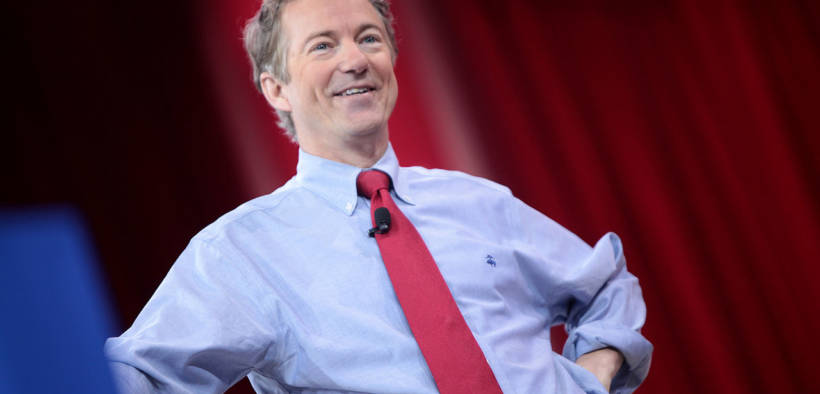Protesters Confront Rand Paul on D.C. Streets After Final Night of the RNC

Paul and his wife were confronted while protests heat up across the country.
Protesters demanding racial justice confronted Republican Senator Rand Paul and his wife as police escorted them back to his hotel after the final night of the Republican National Convention.
The protesters could be heard demanding justice for Breonna Taylor, a 26-year-old black woman who was killed by police after carrying out a no-knock warrant on the wrong house. Taylor was killed in Louisville, Kentucky, the state Paul represents in Congress.
Paul characterized the confrontation as being “attacked by an angry mob of over 100”. Paul also thanked the police for “literally saving our lives from a crazed mob.”
Video of the incident does not show any protesters touching Paul or his wife. A police officer who was using a bike to push back protesters fell after protesters pushed back, but he was uninjured in the incident.
Black Lives Matter protesters had gathered during the night to demonstrate for racial justice while the Republican Party made a fireworks show of the final night of its convention. Confrontations between police and protesters turned violent with some participants fighting back against the police.
Protests Get New Wind
Three months since a Minneapolis police officer killed George Floyd, antiracist protests and the Black Lives Matter movement is still in the streets in many US cities. Street activity has been ebbing and flowing with local incidences sparking increased action.
But, recent events in Kenosha, Wisconsin have renewed calls on the left for racial justice. The police shooting of Jacob Blake on Sunday sparked an uprising in the Wisconsin town of about 100,000. According to Blake’s family, he is now handcuffed to his hospital bed as he recovers.
On the third night of unrest in Kenosha, Kyle Rittenhouse, a 17-year-old militia member killed two protesters and injured another.
A widespread outcry has also led to further high-profile actions in the street and in public life. The NBA’s Milwaukee Bucks did not take the court in their playoff game to protest Blake’s shooting in nearby Kenosha. A league-wide strike followed and captured the attention of the nation with other leagues and stars joining in.
In the streets, Los Angeles, Louisville, Milwaukee, Minneapolis, Philadelphia, Sacramento, Seattle, and more have seen increased activity in protests and police response.
A group of Milwaukee activists marching to Washington D.C. was shot at in Pennsylvania leaving one protester injured. In Louisville, police arrested 71 protesters demonstrating for justice in the Breonna Taylor case.
Dangers Increasing for Protesters
In the first wave of protests, demonstrators, press, and bystanders fell victim to violence and arrests. A bigger picture is beginning to emerge about different threats to citizens part of the movement.
According to data gathered by Alexander Reid Ross, a doctoral fellow at the Center for Analysis of the Radical Right, since May 27 protesters have been subject to 64 cases of assault, 38 incidents of vigilantes driving cars into crowds, and nine times shots were fired at protesters.
Protesters are also seeing their rights being stripped away in several states. In Tennessee, the state legislature passed a law that makes camping overnight outside the Capitol a felony.
Protesters across the country are also facing heavy charges for protesting including felony and terrorism charges.
“To say that the power of the state will be wielded in this way against political enemies is incredibly frightening,” Kate Chatfield, policy director at the Justice Collaborative, told The Intercept.
But despite the threats, many protesters are committed to staying in the streets to demand racial justice and a change in the American policing system.















